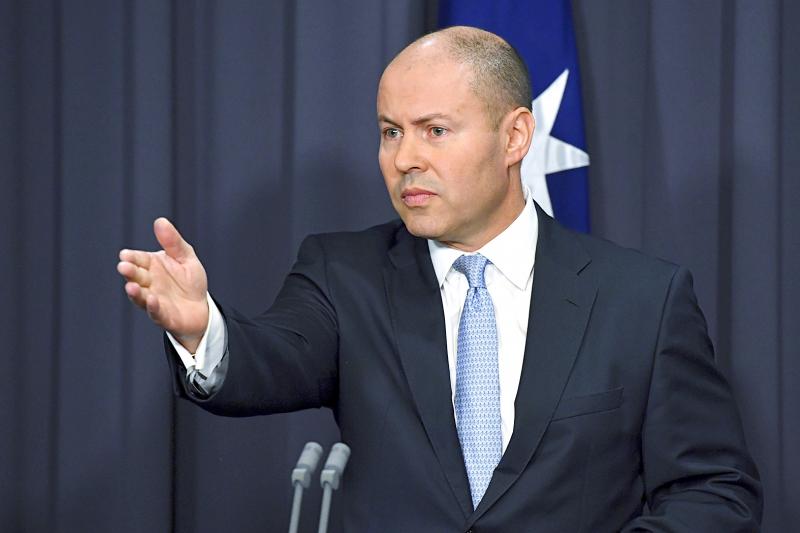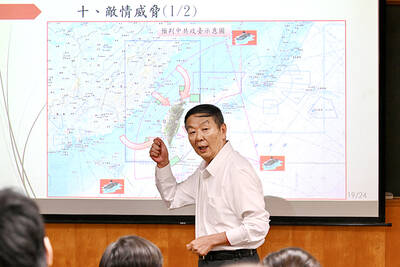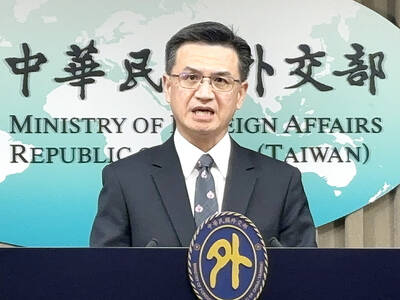Australia’s parliament yesterday passed landmark legislation requiring global technology companies to pay for local news content, in a move closely watched around the world.
The law passed easily after a last-gasp deal that watered down binding rules that Facebook and Google had fiercely opposed in return for the tech companies agreeing to pay local media companies.
The law paves the way for Google and Facebook to invest tens of millions of US dollars in local content deals, and could prove a model for resolving the firms’ tussles with regulators worldwide.

Photo: AP
Google is to pay for news content that appears on its “Showcase” product and Facebook is expected to pay providers who appear on its “News” product.
Regulators had accused the companies of draining cash away from traditional news organizations, while using their content for free.
Big tech firms had fiercely opposed the legislation from the outset, fearing it would threaten their business models.
The firms objected to rules that made negotiations with media companies mandatory and gave an independent Australian arbiter the right to impose a monetary settlement.
That prospect was dramatically reduced by last-minute government amendments.
“The code encourages parties to undertake commercial negotiations outside the code, and the government is pleased to see progress by both Google and more recently Facebook in reaching commercial arrangements with Australian news media businesses,” Australian Treasurer Josh Frydenberg said in a statement.
Google was also eager to avoid creating a precedent that platforms should pay anyone for links, something that could make their flagship search engine unworkable.
Facebook — which is much less reliant on news content — had initially said that being forced to pay for news was simply not worth it and shut down access to news content for its Australian users.
The government said that the law, called the News Media and Digital Platforms Mandatory Bargaining Code, would ensure that news businesses “are fairly remunerated for the content they generate, helping to sustain public interest journalism in Australia.”
Facebook and Google have two more months to reach further agreements that would stave off binding arbitration.
Critics of the law say that it punishes innovative companies and amounts to a money-grab by struggling — but politically connected — traditional media.
Tech insiders see the legislation as driven by News Corp, which dominates the local media landscape and has close ties with Australia’s conservative government.

Taiwan has experienced its most significant improvement in the QS World University Rankings by Subject, data provided on Sunday by international higher education analyst Quacquarelli Symonds (QS) showed. Compared with last year’s edition of the rankings, which measure academic excellence and influence, Taiwanese universities made great improvements in the H Index metric, which evaluates research productivity and its impact, with a notable 30 percent increase overall, QS said. Taiwanese universities also made notable progress in the Citations per Paper metric, which measures the impact of research, achieving a 13 percent increase. Taiwanese universities gained 10 percent in Academic Reputation, but declined 18 percent

RETHINK? The defense ministry and Navy Command Headquarters could take over the indigenous submarine project and change its production timeline, a source said Admiral Huang Shu-kuang’s (黃曙光) resignation as head of the Indigenous Submarine Program and as a member of the National Security Council could affect the production of submarines, a source said yesterday. Huang in a statement last night said he had decided to resign due to national security concerns while expressing the hope that it would put a stop to political wrangling that only undermines the advancement of the nation’s defense capabilities. Taiwan People’s Party Legislator Vivian Huang (黃珊珊) yesterday said that the admiral, her older brother, felt it was time for him to step down and that he had completed what he

BULLY TACTICS: Beijing has continued its incursions into Taiwan’s airspace even as Xi Jinping talked about Taiwan being part of the Chinese family and nation China should stop its coercion of Taiwan and respect mainstream public opinion in Taiwan about sovereignty if its expression of goodwill is genuine, the Ministry of Foreign Affairs (MOFA) said yesterday. Ministry spokesman Jeff Liu (劉永健) made the comment in response to media queries about a meeting between former president Ma Ying-jeou (馬英九) and Chinese President Xi Jinping (習近平) the previous day. Ma voiced support for the so-called “1992 consensus,” while Xi said that although the two sides of the Taiwan Strait have “different systems,” this does not change the fact that they are “part of the same country,” and that “external

UNDER DISCUSSION: The combatant command would integrate fast attack boat and anti-ship missile groups to defend waters closest to the coastline, a source said The military could establish a new combatant command as early as 2026, which would be tasked with defending Taiwan’s territorial waters 24 nautical miles (44.4km) from the nation’s coastline, a source familiar with the matter said yesterday. The new command, which would fall under the Naval Command Headquarters, would be led by a vice admiral and integrate existing fast attack boat and anti-ship missile groups, along with the Naval Maritime Surveillance and Reconnaissance Command, said the source, who asked to remain anonymous. It could be launched by 2026, but details are being discussed and no final timetable has been announced, the source